2023 | 24 ANNUAL REPORT

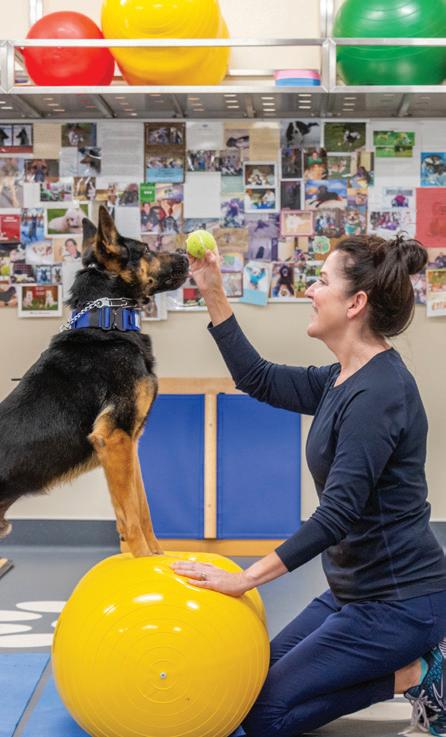



















Greetings!
As I find myself a few months into my tenure as dean of this incredible community, I’m so thankful for the warm welcome my family and I have received.
Before I say more, I want to offer my sincere thanks to Mark Markel and his wife, LuAnn Shay, who have been great friends and mentors during this transition. As our community, friends, and supporters know, Mark’s 12 years of leadership set the SVM on a very strong course – several highlights of which you’ll read about on the pages to follow.
The amazing students, staff, faculty, and house officers who are part of the SVM underpin the School’s dedication to advancing animal and human health and commitment to growing the next generation of practitioners and leaders. It has been wonderful to get to know them better through listening sessions, townhalls, and walks through our hallways. I’ve also had the chance to travel across Wisconsin to meet veterinarians and legislators as well as leaders in agriculture, biomedicine, and business. These interactions and those within our School will help shape our shared vision to build on the SVM’s reputation of excellence.
As we work together to make progress on key priorities – fostering a smooth transition to our new DVM curriculum; ensuring our new and renovated spaces support our outstanding people, research and clinical care; and recruiting and retaining the highest caliber faculty and staff – I will continue to seek out ways for all of us to stay connected and engaged. This is part of my commitment to open and thoughtful communication, which I believe are hallmarks of a healthy and thriving organization.
My family’s move from Texas to Wisconsin has been an interesting and wonderful experience so far. As we navigate the change from “y’all” to “ope” and from barbeque to cheese curds, we’re also attending exciting Badger athletics events and receiving tips on surviving winter in Wisconsin. And, every day, I’m working to build the relationships and connections that will advance the SVM and the important and exciting work we’re doing together.
These first few months have underscored how strong our community is, and I’m truly honored to be a part of it.
Until next time ... On, Wisconsin!

JONATHAN LEVINE Dean, UW School of Veterinary Medicine


# 1


# 7 in most active patents of any veterinary medical school or college, and number of patents per faculty member Fundamental data provided by Academic Analytics veterinary medical school in the nation according to the 2023 US News and World Report
# 18 in the world according to the 2023 QS World University Rankings

$26.3M total research and extramural awards (federal and non-federal) 2023-24

JONATHAN LEVINE, DVM
Dean
RICHARD BARAJAS, MIPA, MPH
Assistant Dean for Diversity, Equity, and Inclusion
FARIBA KIANI-ANARAKI, CPA Chief Financial Officer
LYNN MAKI, MA Ed
Associate Dean for Student Academic Affairs
NANCY PARKINSON
Assistant Dean for Human Resources & Payroll
PEGGY SCHMIDT, MS, DVM
Associate Dean for Professional Programs
CHRISTOPHER SNYDER, DVM
Associate Dean for Clinical Affairs; Director, UW Veterinary Care
MARULASIDDAPPA SURESH, DVM, MVSc, PhD
Associate Dean for Research & Graduate Training
KRISTI V. THORSON, MA
Associate Dean for Advancement & Administration
LAUREN TREPANIER, DVM, PhD
Assistant Dean for Clinical & Translational Research
KRISTEN BERNARD, DVM, MS, PhD Pathobiological Sciences
NIGEL COOK, BSc, BVSc Medical Sciences
GILLIAN MCLELLAN, BVMS, PhD Surgical Sciences
CHAD VEZINA, PhD Comparative Biosciences
Editorial Staff
WRITING, EDITING Maggie Baum
DESIGN, PRODUCTION Lexi Swain
PHOTOGRAPHY
Moffitt
The UW School of Veterinary Medicine uses gift funds to produce its publications. To donate to the school, contact:
HEIDI KRAMER
Senior Director of Development heidi.kramer@supportuw.org (608) 327-9136

Learn more about the ways the UW School of Veterinary Medicine is advancing animal and human health: vetmed.wisc.edu | uwveterinarycare.wisc.edu
This report is also available online at vetmed.wisc.edu/annual-reports


Change is constant, and it’s a necessary ingredient in meaningful growth and positive progress. As we share highlights from the 2023-24 school and fiscal year at the School of Veterinary Medicine, we find ourselves moving through several important transitions and continuing to reinforce our reputation of leadership and excellence.
In 2023, we celebrated the end of an incredibly successful capital campaign in support of a major building and renovation project. The following spring, a significant, student-centered curricular revision passed by an overwhelming positive faculty vote. As summer began, we honored outgoing Dean Mark Markel for 12 years of dedication and service and prepared to welcome Dean Jonathan Levine to begin his tenure. At the same time, we opened the doors of the new SVM North building, ushering in an era in which our new and renovated spaces match the high caliber of teaching and learning, research, and clinical care that happens here every single day.
In the hallways of our school and teaching hospital, from our students to our faculty and staff to school leadership, there is a pace and a rhythm. There is growth and change. There are challenges and opportunities. There is excitement and pride. Most of all, there is sense of community – full of heart and willing to work hard – dedicated to our mission of advancing human and health with science and compassion.




In the fall of 2025, our DVM students will be entering a recently revised, student-centered curriculum designed to foster critical thinking, clinical reasoning, and lifelong learning skills. Passed in spring of 2024 by an overwhelmingly positive faculty vote, this innovative approach to learning – shaped by an intentional, strategic and collaborative process – focuses on ensuring our students are equipped to excel as veterinary medical professionals on day one and have the real-world tools and skills to flourish in a complex and changing world.
On the flip side to the curricular revision, students now have enhanced opportunities to track their progress in key clinical skills through two significant mechanisms: Directly Observed Procedural Skills (DOPS), a system that provides in-the-moment feedback on tasks performed in clinic; and the Competency-Based Veterinary Education framework (CBVE), which sets end-of-rotation evaluations to align with the American Association of Veterinary Medical Colleges and consists of 32 competencies in 9 domains ranging from clinical reasoning to public health to practice management.
The pilot year of the Alumni-Student Mentor Program brought together 46 mentor/mentee pairs to foster students’ professional and personal growth through one-on-one mentorship, connection, and collaboration with alumni practicing in the veterinary medical field. Participants saw immense benefit in the program’s first year, with 91% positive feedback reported from student participants and alumni finding significant value in giving back to the school in a meaningful way through mentorship.
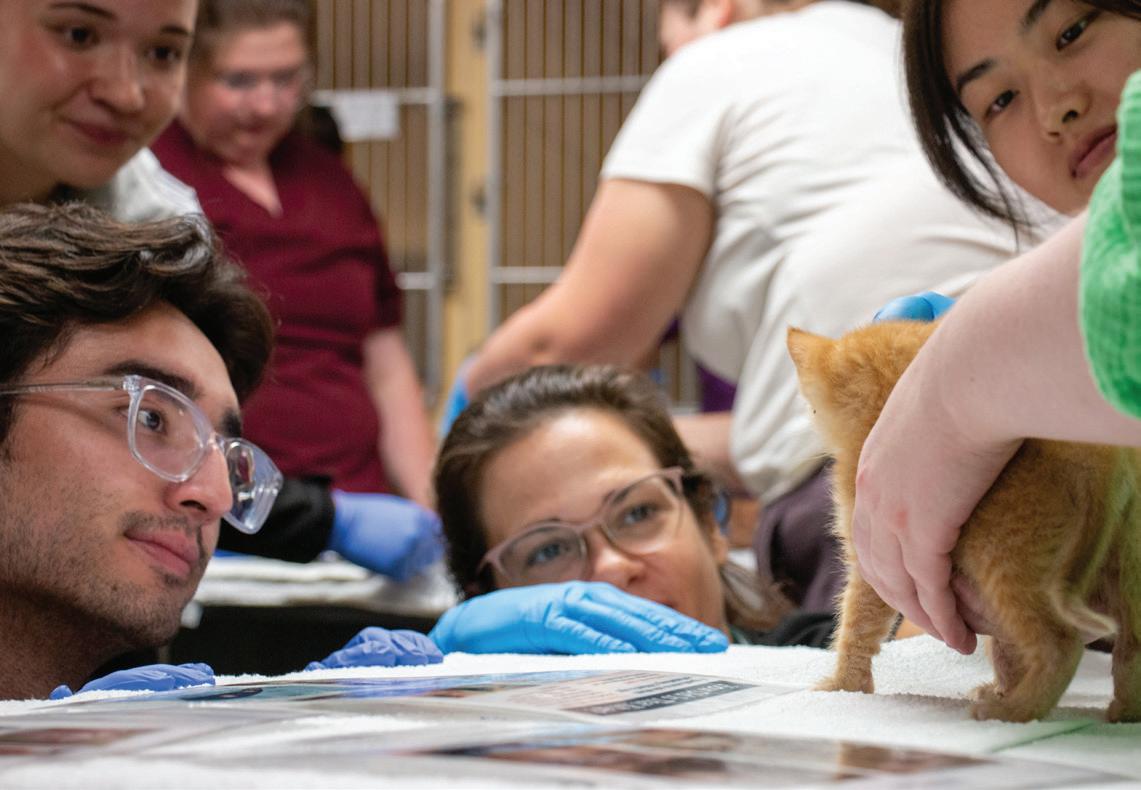


$2,650 100%
OF SCHOLARSHIP APPLICANTS RECEIVED AID
AVERAGE SCHOLARSHIP AWARD*
SCHOLARSHIP DOLLARS*
*includes general and off-cycle scholarships, tuition revenue scholarships, Advanced Opportunity Fellowship scholarships, and Board of Regents Trust Scholarships.
**includes those with no DVM debt, total educational debt
DVM Class of 2023 Student Debt Load** Averages Upon Graduation
LOWER THAN THE NATIONAL AVERAGE 25% UW DEBT IS UW NATIONAL $113,752 $151,871
96 STUDENTS ACCEPTED AVERAGE GPA 3.74
out of 2,261 applicants
248 WI Residents 2,013 Non-Residents
RESIDENCY GENDER
WI Resident 63 Non-Resident 33
44
Undergraduate colleges & universities represented
* Includes avian/exotics, veterinary pathology, and undecided
Environmental Science
Genetics
Health Administration
Law
Microbiology
Neurology
Physiology
Psychology
Sociology
Veterinary Sciences
Zoology

In June of 2024, a vision that had been more than a decade in development became a reality with the opening of the initial phases of the SVM North building. More than a vibrant new space, SVM North is a vital investment in maintaining our reputation of leadership and excellence in veterinary medical education, leading-edge clinical care, and research that extends and improves the lives of pets and the people who love them.
Designed to thoughtfully serve the needs of all constituents – patients, clients, clinicians, students, scientists and staff members – the expansion gives our outstanding faculty, staff, and students the space, equipment, and technology that matches the caliber of work they do every day to advance animal and human health.
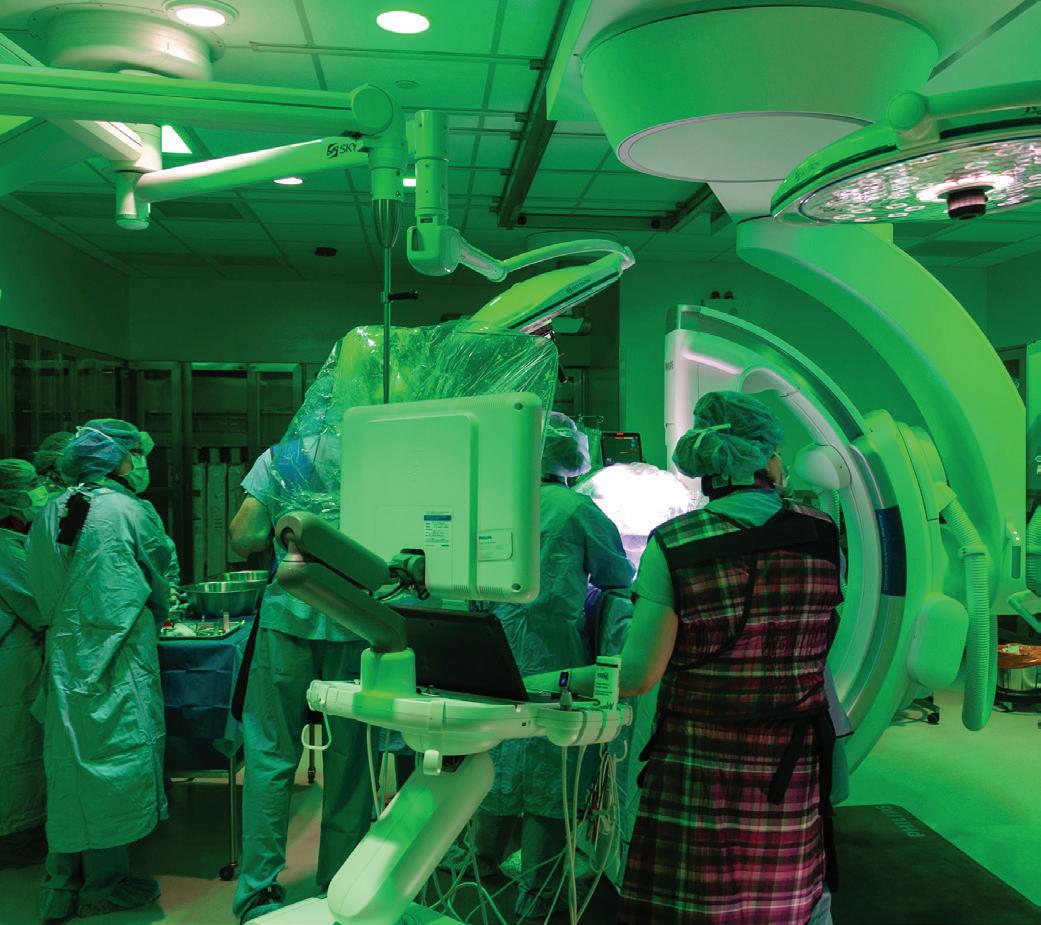

Key features include dedicated rounds rooms within each service that facilitate case collaboration as well as interaction between students and faculty; a variety of waiting areas specific to dogs and cats to help traffic flow and reduce stress; and designated areas for various levels of care, from isolation to critical to intermediate, which streamline staffing and provide safer and more comfortable care for animals based on condition and need.
“As our students, clinicians and team members get settled, it’s exciting to see how the painstaking plans we made are becoming the new normal,” says Christopher Snyder, director, UW Veterinary Care, and associate dean for clinical affairs. “Every day I’m seeing new learning opportunities in action, thoughtful interactions among teams, and tangible benefits to clients and patients.”

Scan to read more about SVM North Canine 19,696
818 Avian 763
Bovine 204 Lapine 675
Total Visits
1,045
*includes Rodentia, Reptile, Porcine, Mustelidae, Camelid, Insectivora, Caprine, Marsupial, Ovine, Primate, Fish, Amphibian, and other mammals. Other*
27,829
New SVM North facilities include nine operating theaters, 15 private exam rooms, a state-of the art cardio interventional suite (below left) and more.

Capacity for cases annually (original building was designed to accommodate about 12,000; we currently see nearly 30,000)
New square feet of space in SVM North (plus 35,000 sq. ft. of modernized spaces in SVM South)
35,000+ 150,000 14,000 3 15 9
Square footage of new covered arena for enhanced large animal care and isolation
New stateof-the-art operating theaters New small animal exam rooms Fully functioning echocardiogram bays
When Lisa Edge first met Poppy at the Iowa County Humane Society, she knew she’d become part of her family. Poppy, an American Bulldog mix, was rescued from the side of the road by an Avoca police officer. Emaciated and neglected, Poppy suffered abuse at the hands of her original owner – who was later sentenced to 10 days in jail – for the first six years of her life. She carried a mere 64 pounds on her large frame. She was hairless, diabetic, and blind with a host of critical health conditions. The complexity of Poppy’s case led Edge to UW Veterinary Care, where she found much needed hope as the dedicated care team systematically addressed her many needs.
“With medication adjustment and a lot of care, Poppy has only been getting better,” says Vanessa Bruneau, a resident in small animal internal medicine. “It’s amazing to see how loving and trusting she is after everything she’s been through, and seeing the beautiful community surrounding Poppy shows us of the importance of pets in peoples’ lives and reminds us why we all wanted to work in veterinary medicine.”
Under Edge’s care and with support from UWVC, Poppy has gotten to a healthy weight, grown back fur and been treated for her most immediate needs. “Poppy’s story has given thousands of people hope – some are fighting illnesses, some are lonely and some have been at a point where they wanted to give up,” Edge says. “Enter Poppy, a survivor who has defied all odds. She is the poster pup for hope.”
Poppy, now recovering and thriving, with her biggest champions: adoptive mom Lisa Edge and members of Poppy’s UWVC compassionate care team.


Our modernized, collaborative lab spaces are critical to continue our world-class research programs and advance our commitment to the concept of ‘One Health’ for animals, people, and planet. SVM researchers conduct 75% of all infectious disease research on campus, from COVID to influenza and beyond, and communities from our own backyard to the other side of the world benefit from the life-improving and life-saving discoveries that happen here every day.
Marulasiddappa Suresh, John E. Butler Professor in Comparative and Mucosal Immunology and associate dean for research and graduate education

Under the leadership of Marulasiddappa Suresh (shown above), and in the wake of a global pandemic, new research from the SVM is advancing our understanding of how mRNA vaccines protect the lungs following breakthrough infections from emerging variants of SARS-CoV-2. In addition, SVM was awarded $3.7 million from the USDA’s Animal and Health Plant Inspection Service to help develop vaccines to prevent transmission of coronaviral infections between animals and humans.
Gillian McLellan (Tim and Nancy Speaker Chair in Canine Health, Department of Surgical Sciences), along with Peter Muir (Department of Surgical Sciences), leads a team – with significant input and support from graduate students, PhD candidates and other researchers – working to detect genetic associations and causal variants that predict the development of glaucoma. The ongoing clinical
study, Genetic Basis of Glaucoma in Entlebucher Mountain Dogs, is working toward developing a genetic test that will lessen the occurrence of this very painful and rapidly blinding disease. With research also underway on Siberian Huskies, the results are showing promise in deepening our understanding of genetic determinants that cause glaucoma in animals and humans and are paving the way for new and improved treatments.

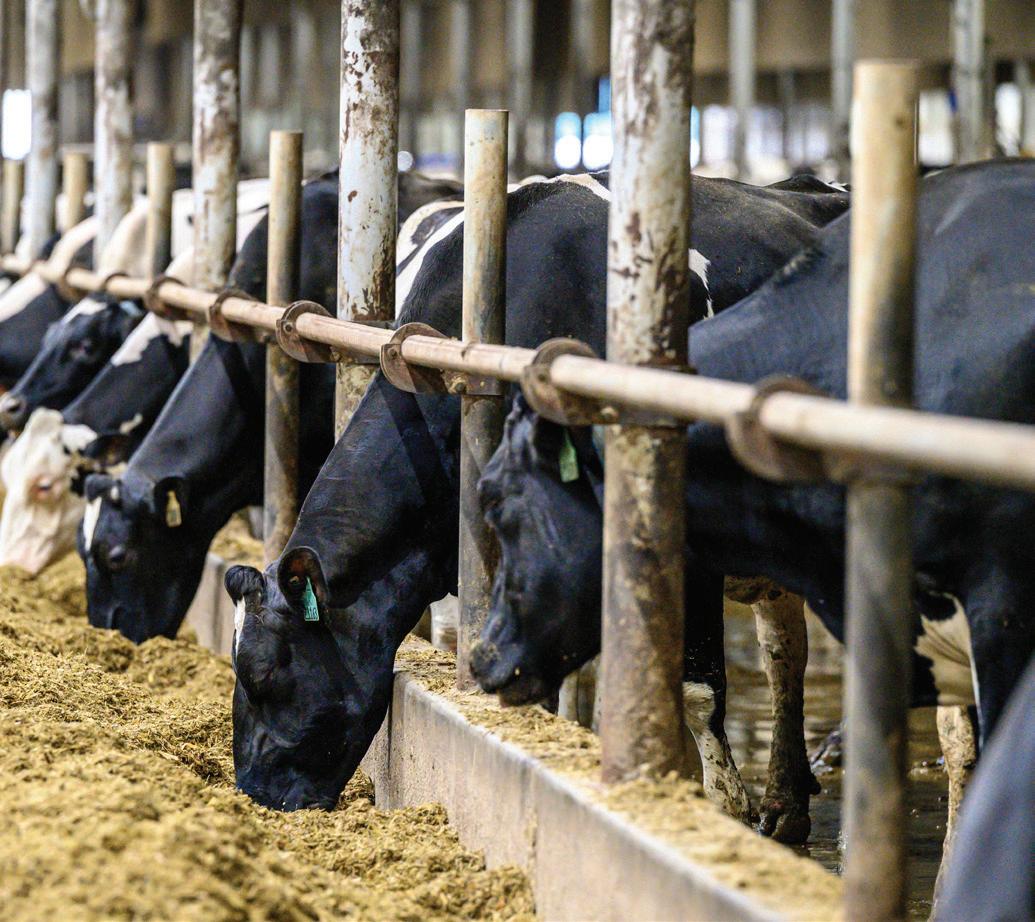
SWM and WVDL
members have been at the forefront of a collaborative effort to study, monitor, and mitigate the spread of highly pathogenic H5N1 in
Right: The McLellan lab is working toward a genetic test that will lessen the occurrence of glaucoma in Entlebuchers like Finn, shown here with his first signs of the disease and healed after surgery, while also paving the way for new and improved treatments for animals and humans.

Scan for the full article
The SVM and the Wisconsin Veterinary Diagnostic Lab (WVDL) have been at the forefront of a collaborative effort among industry, government, and regulatory agencies to study, monitor, and mitigate the spread of highly pathogenic H5N1 in dairy cattle. The depth and scope of the coordinated response is a significant example of SVM’s leadership in action and how the Wisconsin veterinary medical community is an integral part of managing disease outbreaks that put human health at risk. The SVM’s Yoshiro Kawaoka (WARF Professorship in Recombinant Influenza Viruses; Department of Pathobiological Sciences) and Peter Halfmann (’01 PhD’08; Department of Pathobiological Sciences), along with WVDL director Keith Poulsen (’00 DVM’04 PhD’12; Department of Medical Sciences), were among leading signatories to a letter about risk to the supply of cow’s milk published in the renowned New England Journal of Medicine.


Mussels are a vital part of any freshwater ecosystem, playing a part in water filtration, food webs, and habitat stabilization, and Tony Goldberg (Department of Pathobiological Sciences) has been studying decline in mussel populations for years. Research published in the Journal of Virology, along with co-author Jordan Richard (then a PhD candidate in Comparative Biomedical Sciences) spotlights the discovery of a new rhabdovirus in Western Pearl Shell mussels. The findings shed light on another group of viruses that infect fish and can lead to large kills in a variety of species – with, of course, implications that extend beyond fish to animals, plants, and fungi.


Top: Tony Goldberg and team at work in the field. Bottom: David Vail’s team is preparing the launch a clinical trial to test a new immune-stimulating treatment for managing hemangiosarcoma in dogs.
Cancer remains the number one cause of death in adult dogs and cats. Veterinary oncologist David Vail (Barbara A. Suran Distinguished Chair in Comparative Oncology; Department of Medical Sciences), one of the SVM’s leading researchers in canine cancer, has continued to investigate cancer diagnostics, treatments, and prevention in all species. Vail is currently taking part in the largest clinical trial to date on canine cancer – in the form of a vaccine that’s showing promise in early analysis – as he prepares to launch a significant new clinical trial to test a new immune-stimulating treatment to be used alongside chemotherapy for managing hemangiosarcoma in dogs.

So many of our outreach efforts exemplify the Wisconsin Idea – one of the great traditions and principles of UW-Madison – in action. From the Dairyland Initiative to Shelter Medicine to the interactive Tick App, the ways in which we partner, connect, and collaborate foster incredible experiences and influences that extend far beyond the walls of our classrooms, teaching hospital, and lab spaces.
Dean Jonathan Levine



Last year we celebrated the 10th anniversary of WisCARES, a program that provides subsidized veterinary care to pet owners experiencing homelessness, based on the core tenant that all families with pets deserve access to veterinary care and that everyone – regardless of financial or housing status – benefits from the human-animal bond. In 2024, the SVM’s program for Shelter Medicine reached the same 10-year milestone. Under the leadership of Sandra Newbury (DVM ’03; Department of Medical Sciences), Shelter Medicine is a national leader focused on outreach, education, research, and community engaged care. From urban and rural shelters to targeted outreach through partnerships with Native Nations, Shelter Medicine continues to strive for the development of meaningful relationships that foster innovative thinking with students, veterinarians, animal welfare organizations, and communities both nationally and internationally. The team continually advocates for well-being, lifesaving, and community engagement as fundamental components of any plan for animal care and services, shelter care, or infectious disease outbreak response.

The Dairyland Initiative (DI) continues to expand its leadership locally, nationally, and internationally as a top resource for managing and optimizing dairy cattle housing and health. Informed by clinical and academic research, the DI strives to create an economically viable and competitive dairy industry for all – farmers, veterinarians, nutritionists, lenders, builders, and other industry consultants. On the heels of their development of the Mooving Cows interactive game, where users learn how to move cows efficiently and effectively, in May of 2024 the DI launched their own podcast. Hosted by Courtney Halbach and Nigel Cook (Chair, Department of Medical Sciences), the show discusses practical dairy cattle housing solutions and showcases approaches dairy farmers are taking to enhance cow welfare and animal health in their herds through improved barn design and management. Conversations cover all aspects of facility design from ventilation to freestall design to calf housing and more, as well as hot topics related to lameness prevention, cow comfort, and productive life.
In spring of 2024, two of Wisconsin’s largest zoos made headlines for innovative and exciting veterinary procedures, both of which included representatives from the SVM and UW Veterinary Care. Kendi, a male reticulated giraffe at the Milwaukee County Zoo, made a full recovery after successfully undergoing a complex surgery — due to a unique breeding injury — that has never been performed on the species. This historic achievement was the result of intense planning and a large, collaborative effort across multiple institutions and veterinary disciplines. Several veterinary professionals from SVM and UWVC who work in large animal, anesthesiology, and zoo medicine were involved in planning and were on hand for Kendi’s first-of-its-kind procedure. In addition, Datu – a critically endangered male Bornean orangutan at Madison’s Henry Vilas Zoo – underwent echocardiogram as part of a comprehensive routine exam. Under general anesthesia, Datu also received bloodwork, TB testing, and an upper and lower GI endoscopy. Datu’s echocardiogram was conducted in collaboration between the zoo care team, the Great Ape Heart Project, and the SVM Cardiology Service. SVM anesthesiologists were also on hand to assist.
Scan for the full article




While summer in Wisconsin brings outdoor fun & recreation, along with that comes increased exposure to ticks and tick-borne disease. The Tick App is a mobile app designed to help reduce exposure while assisting with research in trends and risks. According to Lyric Bartholomay (PhD’04; Dr. Bernard C. Easterday Professor in Infectious Diseases; Department of Pathobiological Sciences), co-director of the Midwest Center for Excellence for Vector-Borne Disease, the Tick App – which was created in partnership between the Midwest and Northeast Centers for Excellence – gives reminders to do tick checks, shares information for removing ticks, and provides users with tick identification services. Users can submit a photo for expert identification and get alerts on tick activity in Wisconsin. The app encourages people to become citizen scientists and supports research to better understand how and where people are becoming exposed to ticks to aid in designing better strategies to reduce people and pet exposure to ticks and tick-borne disease.



The SVM sent seven members of its faculty and staff to the Iverson Bell Regional Diversity Summit at the University of Minnesota in May of 2024, two years after it was hosted here at the SVM. The summit included more than 100 attendees from across the Midwest focusing on how to make our schools inclusive environments for all in our community.
In February 2024, SVM students Cady McGee (DVMx’26), Caroline Berge (DVMx’27), Nicolette Leston (DVMx’27), and Ethan Elazegui (DVMx’26) visited with the Wisconsin Congressional Delegation in Washington, DC. This AVMA legislative event helps future veterinarians learn how to develop relationships with their elected officials and become trusted voices of veterinary medicine.
One of the first things Mark Markel set out to accomplish when he began his 12-year tenure as dean was a major building expansion and renovation, addressing a need that had been apparent and under discussion for years. The vision came full circle in spring of 2024 – as Markel transitioned out of his role and the SVM prepared to welcome Dean Jonathan Levine –with the opening of the initial phases of the new SVM North Building.
The complete scope of the project includes the construction and phased opening of SVM North (approximately 150,000 square feet) as well as significant renovations to the original SVM South building (35,000 square feet), which are currently underway and targeted for completion in 2025. New and renovated spaces are designed to thoughtfully serve the needs of all constituents – patients, clients, clinicians, students, scientists and staff members – in a variety of ways (see pages 8-9 for more details).
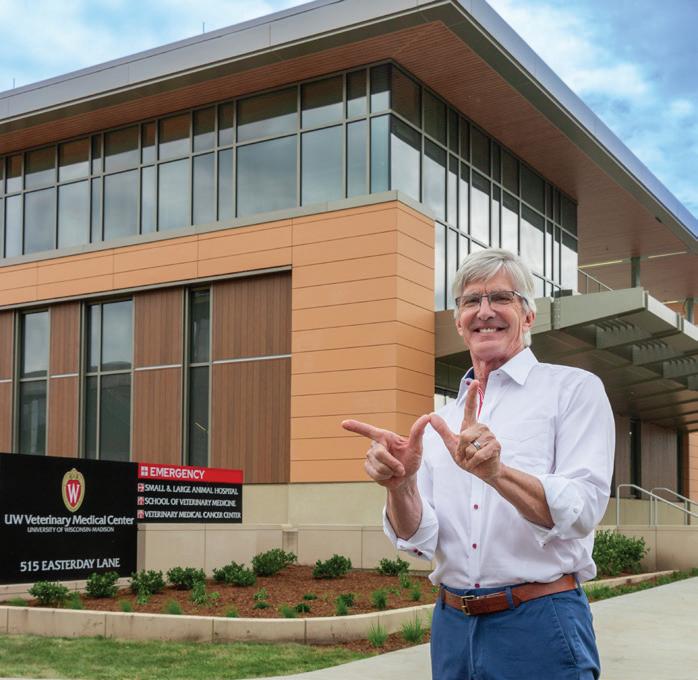

The $174 million project was made possible by state support and the generosity of friends of the SVM including:
650 households 1,000 individuals & organizations $500 median gift amount $62.5M in private gifts
Donors represent:
41 different counties in WI
37 of the 50 states in the US
The SVM has a stellar reputation in Wisconsin and beyond, and we’re consistently ranked in the top SVMs in the country. Our ability to train the very best veterinarians is now greatly enhanced, and our new facilities will attract the best students, teachers, and researchers to have an even greater impact on animal and human health.
Debbie
Cervenka, SVM board of visitors member and co-chair of the Animals Need Heroes Too capital campaign
EXPENDITURES BY SOURCE
* State appropriations (less estimated tuition and fees)
EXPENDITURES BY PURPOSE
* Student services, public service, and academic support
** Primarily research grants and contracts
GIFTS RECEIVED IN FY24 SUPPORTED THE FOLLOWING:
$1,587,000
Facilities (building & equipment)
$1,000,000
Research
$958,000 Discretionary
$800,000
Student scholarship and awards
$762,000
Outreach and public service
$634,000
Faculty support
$94,000
Education and student support
$34,000
Other
The above includes gifts, pledge payments and realized estate gifts in FY24 and does not reflect pledges or planned gifts. Some gifts were directed to endowed funds and so are not available for immediate use but instead will generate ongoing funding.
The SVM’s Board of Visitors serves as an external advisory body to the dean. Members have experience and expertise both in the veterinary medical field and beyond. Their sound advice and counsel is invaluable in advancing the broader mission of the school and in helping move specific initiatives forward.
Tom Bach BBA’86, DVM’94* Madison, Wisconsin
Nancy Ballsrud MBA’75 Minneapolis, Minnesota
John Baumann ’82 Monroe, Wisconsin
Debbie Cervenka Santa Rosa Beach, Florida
Margo Edl Middleton, Wisconsin
Patrick S. Farrell MS’83, DVM’87* Russell, Pennsylvania
Charity Gottfredsen ’02, MS’07, DVM’07* Chicago, Illinois
Dan Grimm Waterford, Wisconsin
Peter Hanson MS’94, PhD’97* Boston, Massachusetts
Pam Jahnke Madison, Wisconsin
Carlton Jenkins MS’93, PhD’09 Madison, Wisconsin
Phil Jennings JD’93 Madison, Wisconsin
Diane Larsen ’80, DVM’90, PhD’99* Duluth, Georgia
Jeffry A. Neuenschwander ’82 Detroit, Michigan
We greatly appreciate the contributions of the SVM’s Alumni Advisory Board, which enhance the school’s support of and relationship with alumni by providing input on alumni-related activities, communications, and opportunities for engagement.
Tom Bach BBA’86, DVM’94
Holly Hovanec DVM’18
Diane Larsen ’80, DVM’90, PhD’99
Jennifer Lorenz DVM’09
Debra Olbrich DVM’07
Brad Poff DVM’87
Kathy Reilly DVM’90
Ann Sherwood Zieser DVM’90
Ty Vannieuwenhoven DVM’89
Jill Pelisek Milwaukee, Wisconsin
Janet Raddatz Plymouth, Wisconsin
John Schaefer ’81 Harshaw, Wisconsin
Suzy Shain BS’87, MBA‘90 Verona, Wisconsin
Karl Solverson ’94, DVM’99* Westby, Wisconsin
Karen Walsh ’81, MA’89 Madison, Wisconsin
Jeffrey R. Zuba ’81, DVM’87* San Diego, California

Scan to read more about our members.
All degrees listed are earned from UW-Madison.
* Indicates alumni of the UW School of Veterinary Medicine.
The following is not an inclusive list of awards, but highlights of recognition and accolades received by students, faculty, and staff between July 1, 2023 – June 30, 2024.
Teagan Leah DeForge (Resident, Small Animal Surgery) 1st place, ACVS Surgery Summit Outstanding Surgery Residents’ Awards competition
Lisa Forrest (Department of Surgical Sciences) Bernstein Lifetime Achievement Award, American College of Veterinary Radiology
Chloe Fouilloux (Department of Pathobiological Sciences) Wisconsin Initiative for Science Literacy Award
Yoshihiro Kawaoka (Wisconsin Alumni Research Foundation Professorship Fund in Recombinant Influenza Viruses; Department of Pathobiological Sciences) 2023 Class of Fellows, National Academy of Inventors
Rae McAtee (Resident, Small Animal Internal Medicine) 1st place research poster, American College of Veterinary Internal Medicine Conference
Jill Medenwaldt (UW Veterinary Care) Top Ten winner, 2024 University Staff Recognition Awards
Leah Owens (PhD’23; Department of Pathobiological Sciences) 1st place, 2024 Aurora Pharmaceutical DVM Student Scholarship competition
Carrie Schroeder (DVM’06; Department of Surgical Sciences) 2023 Non-UW Health Faculty Teacher of the Year, UW Department of Anesthesiology
Kellyne Skillin (DVMx’27) Foundation for Food and Agricultural Research Fellowship
Matthew Vander Poel (DVMx’25); Cady McGehee (DVMx’26) Merck Animal Health Bovine Veterinary Student Recognition Award
Fei Zhao (Department of Comparative Biosciences) 2024 Rising Star in Reproductive Biology, Society for the Study of Reproduction
Richard Barajas Chair, Diversity, Equity, and Inclusion Committee; American Association of Veterinary Medical Colleges
Heidi Kramer Vice President, Association of Veterinary Advancement Professionals
Mark Markel (Department of Medical Sciences) President-elect, AO Foundation
Amy Nichelason (Department of Medical Sciences) 2023-24 Harvard Macy Institute Program for Educators in Health Professions
Peggy Schmidt Three-year term, Board of Governors of the Academy of Veterinary Educators
Christopher Snyder (Department of Surgical Sciences; Director, UW Veterinary Care) President-elect, American Veterinary Dental College
Liddy Alvarez (Department of Medical Sciences) Ruth M. Skaar Chair in Veterinary Medicine
Yoshihiro Kawaoka (Department of Pathobiological Sciences) Wisconsin Alumni Research Foundation (WARF) Professorship Fund in Recombinant Influenza Viruses
Gillian McLellan (Chair, Department of Surgical Sciences) Tim and Nancy Speaker Chair in Canine Health
Marulasiddappa Suresh (Department of Pathobiological Sciences) John E. Butler Professorship in Comparative and Mucosal Immunology
John Svaren (Department of Comparative Biosciences) Boespflug Family Professorship in Myelin Biology
Leandro Teixeira (Department of Pathobiological Sciences) Richard R. Dubielzig Professorship for Comparative Ocular Pathology
Lauren Trepanier (Department of Medical Sciences) Melita Grunow Family Professorship in Companion Animal Health
David Vail (Department of Medical Sciences)
Barbara A. Suran Distinguished Chair in Comparative Oncology
2015 Linden Drive
Madison, WI 53706
Published by The University of Wisconsin-Madison School of Veterinary Medicine 2015 Linden Drive Madison, WI 53706
(608) 263-6716




